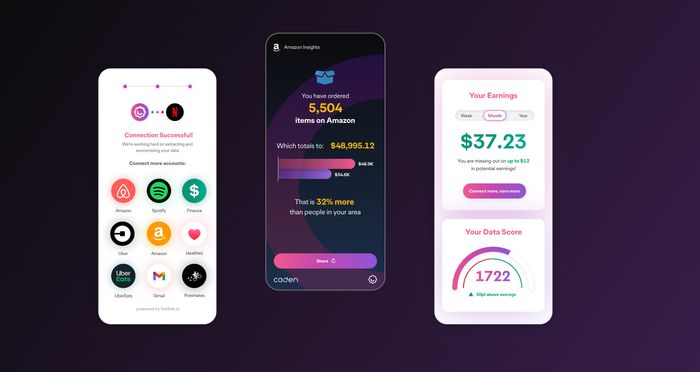As consumers become more privacy aware, an increasing number of startups are emerging to — in line with the trend — enable people to monetize their data. Datacy, for example, lets users collect their browsing data, aggregate it with data from others and then sell it to the highest bidder. Pogo and Tapestri, similarly, grant consumers rewards in exchange for providing access to their behavioral and purchasing data.
But a new player in the space, Caden, is taking a different tack by offering controls that allow users to fine-tune which data they share with third parties. Backed by Yahoo founder Jerry Yang, Caden pulls in analytics data on what movies users watch, where they travel, what they buy and more, and lets those users opt in to monetize their data in various ways.
John Roa, who sold his previous startup, Äkta, to Salesforce in 2015, says he was inspired to launch Caden after observing the paradigm shift occurring in online privacy and personal data access.
“For 25 years, users have ‘exchanged’ their personal data for ‘free access’ to services, apps and websites, resulting in companies accumulating vast amounts of data without prioritizing user privacy,” he told TechCrunch in an email interview. “I envisioned a future where users would be empowered and placed at the center of this data exchange, rather than having it siphoned from them without consent.”
One might argue that privacy laws can accomplish this better than any startup can — and there’s a raft of them.
At least 25 states and Puerto Rico introduced or considered almost 140 consumer privacy bills in 2023, according to the National Conference of State Legislatures. Overseas, there’s the EU’s General Data Protection Regulation (GDPR). But beyond it, a growing body of legislation, including the California Consumer Privacy Act and the Colorado Privacy Act protect consumers’ right to opt out of data tracking and selling.
They don’t necessarily provide mechanisms for users to earn money from selling their data, though, Roa notes.
“Our core offering is, and will always be, empowering users to have more control of their data, and rewarding them if they choose to share it with a trusted third party,” he said. “We offer passive income for users in a safe and sustainable way.”
To sign up for Caden, users have to connect the online services that they already use, like Amazon, Uber and Netflix. From Caden’s iOS app, they can view usage stats, insights and more, as well as ways to monetize specific segments of data by sharing them with advertisers.
That’s a lot of sensitive data to store in one place. But Roa asserts that Caden secures it all in an encrypted “vault,” anonymizing it before sharing it with third parties.
Consumers can opt out of data sharing at any time and have the ability to delete their data by removing their Caden account.
According to Roa, Caden has collected over a billion data points and paid “hundreds of thousands” of dollars in compensation. But that’s only the beginning, he hopes.
To incentivize more people to use the platform, Caden recently launched Caden AI, an AI-powered assistant that leverages the behavioral data shared with Caden to provide content and product recommendations (e.g., “Since you’re traveling to Morocco in a couple of weeks, here’s a great documentary you should watch on Netflix”). It might seem a little invasive to some — including to this reporter. But Roa argues that Caden AI is simply transforming the data that users choose to supply to Caden in a useful way.
“We can contextualize new hobbies or upcoming travel or major life events, rather than generalizing or guessing,” he said. “Users can explore the products and retailers that offer them the best deals — it’ll curate personalized travel experiences tailored to someone’s interests and budget.”

Just how well Caden can “contextualize” remains to be seen. But the company’s not putting all of its eggs in one basket.
On the enterprise side, Caden plans to launch a tool called Context AI that’ll allow customers like marketers to ask natural language questions about consumer behaviors, like “Since Netflix added an ad-supported tier, how have subscription numbers changed amongst key demographics and media consumption habits?” In addition to answering queries in text (e.g., “78% of users who downgraded from a $14.99 subscription to a $6.99 watch less than one Netflix program per week”), Context AI will provide visuals in the form of charts and graphs to emphasize key points.
Investors evidently like this strategy. Caden this week announced that it raised $15 million in a Series A funding round led by Nava Ventures with participation from Yang’s AME Cloud Ventures, Streamlined Ventures, Montage Ventures, Industry Ventures, 1707 Capital and AAF Management.
One imagines that Apple’s new policy requiring apps to ask permission to track users played a role in Caden’s success. So might Google’s plan to phase out certain forms of user tracking in its Chrome browser, set to take effect in the second half of 2024.
Bringing Caden’s total raised to $24.4 million, Roa says that the new tranche will be put toward expanding the company’s New York–based team of around 25 staffers, supporting the development of Caden AI and building additional connections across retailers, loyalty programs, fitness platforms and streaming services.
“We offer one of the most sought-after assets to the enterprise: ethically sourced first-party data,” Roa said. “We also handle a lot of the expensive decision-making and data science. As things tighten up and it becomes more expensive, difficult and cumbersome to understand consumer behavior, we’ll have some of the most powerful tools in the industry to help enterprises do business more efficiently, ethically and sustainably.”
The question is, even if marketers move toward platforms like Caden, will users? The jury’s still out.































Comment